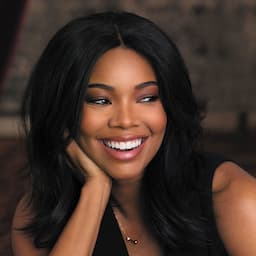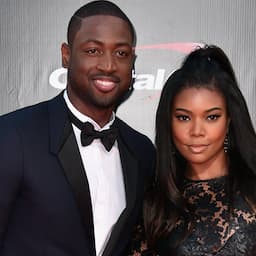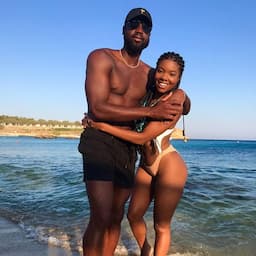The 'Being Mary Jane' star’s new book was released on Tuesday.
There’s a side of Gabrielle Union that her fans have never seen. In her new memoir, We’re Going to Need More Wine, which is out Tuesday, the 44-year-old actress gives readers an inside look at her life.
From growing up in Pleasanton, California, and spending summers in Omaha, Nebraska, where she and her cousin snuck boys into the house (unbeknownst to her grandmother) to becoming an actress, and even building a friendship of sorts with Prince (she landed invites to more than one of his epic parties), Union doesn't hold back. She also shares tidbits her love life, from old boyfriends to prenup negotiations with her husband, Dwyane Wade, as well harder-hitting topics like colorism, ageism, fertility struggles, and the importance of women owning their sexuality.
Although reliving parts of her past was understandably “terrifying," Union faced the tough stories in order to discover her “authentic self.” Whether it’s celebrating her triumphs, or shedding light on her insecurities, the Being Mary Jane star goes all in.
Read on below for seven revelations from Union's new book.
1. Her name isn’t Gabrielle Union.
Well, technically her name is Gabrielle Union, but friends and family call her “Nickie,” a shortened version of her middle name, Monique.
2. Dwyane Wade isn’t the first basketball star to catch her eye.
Long before Wade came into the picture, Union had another basketball star on her arm: Jason Kidd. The two dated when they were in high school, but the teenage dream came crashing down just two weeks before prom.
“He called me that night to officially break up with me, which is exactly what he had done to the girl he dated before me,” Union recalls. “Karma is a b**ch that surfaces quick. I went into this very quick whirlpool of a downward spiral. I began writing a lot of sad, terrible poetry.”
3. She experienced racism at an early age.
Union and her family moved from Nebraska to Pleasanton when she was in elementary school. Relocating to the Northern California suburb came with a painful reality.
“It took less than a year in Pleasanton for someone to call me a n***er. It was during third-grade recess at Fairlands Elementary, and it came from Lucas," she recalls of a Latino student bused in from Commodorsky, a "low-income housing development."
"One day, Lucas decided my name made a great racist alliteration. ‘Nickie’s a n***er!’ he said, pointing at me with a huge smile of revelation, like he’d found me in a game of hide and seek.”
The racist taunting caused Union to suppress her blackness for many years. "With every single move I made and every word I spoke, I stayed hyper alert to what I called the Black Pitfalls," she explains. "What were the things that would make me appear blacker? I only ate chicken with a knife and fork, and never in front of white people. Certainly not KFC. And no fruit on a rind, You were not gonna see a toot-grin-and-watermelon scene from me.”
4. She grapples with the fear of raising young black men amid ongoing police brutality.
In her book, Union gets candid about a fear that many parents of young black men face, and opens up about reminding her stepsons that their celebrity parents don’t exempt them from a potentially deadly encounter. In one passage, Union openly writes about how the boys walking the family dog around their posh Miami neighborhood sent her and Wade into panic mode.
“They are the boys I adore. And people don’t value their very breath,” she writes. “It could be extinguished in one second, without thought, leaving a dog to run, dragging its leash the whole way home. A dog, safer from harm than black boy bodies.”
5. She goes into detail about being raped and the journey from “victim” to “survivor.”
Union has spoken openly about being sexually assaulted as a teenager, but the book goes deep into the horrifying story. In the chapter titled “Code 260” (the criminal code for rape), Union describes the harrowing details of getting raped during her shift at Payless Shoes. She chronicles the moment that her rapist (who was also an employee) walked into the store and robbed the place before putting a gun in her back and leading her and a co-worker into a storage room. He then forced Union into a bathroom where he sexually assaulted her as she fought back and eventually grabbed his gun. He wrestled the weapon out of her hands and pistol whipped her.
In hindsight, Union writes that she's thankful that the assault occurred in an “affluent neighborhood” with an "underworked police department," an "underutilized rape crisis center," and "overly trained doctors and nurses and medical professionals."
"The fact that one can be grateful for such things is goddamn ridiculous,” she points out.
The traumatic experience made her scared to leave the house for a year, and the fear "spiraled" into avoiding any places where money could be exchanged, because she was scared of getting robbed.
Though Union still suffers from anxiety when strangers approach her, there are days when she encounters fellow survivors and they share an unspoken exchange of “Me too.”
6. Her first marriage was a nightmare.
Union's marriage to former NFL player Chris Howard was doomed from the start. She busted Howard for cheating just 24 hours after he proposed, and the cycle of adultery (on both sides) continued throughout the relationship.
Fidelity wasn't the only strain on the marriage. Union was financially supporting Howard after his professional sports career ended, all while the cheating continued. Even though the marriage was "obviously over," Union says she was slow to divorce him because she didn't want to be seen as a "failure." She also found herself doing a "laundry list of dumb things you do when you want your ex to like you,” including investing in a company that he started with one of her friends, paying his rent for six months, and co-signing on a Porsche.
“Then he abandoned the Porsche at the Burbank airport and I inherited a bunch of bills and parking tickets," she recalls. "The businesses failed, so there went that money, too. And like my money, I have never seen him again.”
7. She’ll never forget Heath Ledger.
While shooting the film 10 Things I Hate About You, Union and her cast members became so close that they were initially wary when Heath Ledger showed up "a week into shooting."
“We were so afraid he was going to be a drag," she writes. "Would he fit in? Would he be a jerk?"
But Ledger quickly won the cast over with his "stunning" good looks, and the coolness of a real life "James Bond.”
The Aussie had a special connection with everyone in the cast, and he and Union remained friendly after the film wrapped. “Whenever I ran into him in L.A. after 10 Things, it was like we had just wrapped yesterday," she reveals. "We would both reel off names of people from the movie that we had seen and shared updated on their lives. There was never the weird Hollywood distance that creeps in. You usually get so close on a set and then it’s out of sight, out of mind. You forget you were family for a while. Not this cast. Heath and I would hug and say ‘Take care.’ His loss was a death in the family that all of us felt equally.”



